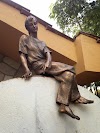Pope Francis mentioned the humanitarian crisis in the area during the "Urbi et Orbi" blessing on Easter Sunday. Later on, he surprised Bishop Luiz Fernando Lisboa (Bishop of Pemba) with a phone call:
Today, August 19, 2020, at 11 pm, to my surprise and joy, I received a call from His Holiness, Pope Francis who comforted me greatly. He said he is very close to the Bishop and all the people of Cabo Delgado and is following the situation experienced in our province with great concern and has been praying for us.
At least twice this year, the Bishops' Conference of Mozambique (CEM) raised their concerns about the situation in the area, assuring their prayers, supporting the local bishop and calling for an end to the conflict:
Having heard the testimony of the situation of great tribulation in which our brothers and fellow citizens of Cabo Delgado are immersed, we want to assure our prayers for all the victims and to express our empathy, communion and solidarity with our brother Bishop, Luiz Lisboa, and to appreciate the witness of pastoral concern that he has boldly and tirelessly given (13 June 2020)We express our fraternal closeness to the brothers and fellow citizens of Cabo Delgado and assure them of our constant prayer in the hope of finding paths of dialogue that will facilitate the end of the terrible conflict and the humanitarian drama (14 November 2020)
The Southern African Catholic Bishops' Conference (SACBC) then decided on a two-day solidarity visit to the Bishop of Pemba and the people of Cabo Delgado. Through the Dennis Hurley Peace Institute (DHPI), Bishop Victor Phalana (Diocese of Klerksdorp), Sr Tshifiwa Munzhedzi OP (SACBC Associate Secretary General), Johan Viljoen (DHPI Director) and myself left for Pemba on December 2.
What did we see?
- we saw a human tragedy still possible in our days and in our part of the world: the reality of people who had to leave everything behind without thinking twice about it to be able to save their lives and the lives of their families. Attacked in the early hours of the morning, the choices were escaping, dying or - maybe - being taken;
- we saw the tragedy of children who separated from their families as they ran away in different directions. In other cases parents were in the fields and neighbours protected the children by taking them. As the bishop of Pemba shared with us: "one day 35 children arrived in Pemba. They arrived together without their parents". Everywhere we met displaced people, these stories were part of their sharing;
- we saw refugee camps organised by the government to care for the displaced. In one place we were told that: "After the attacks in September, 14.000 people arrived in the area and they were organised in two camps". Pemba, with a population of 200.000 people has received 150.000 displaced;
- we saw what it means to have to leave everything behind with the awareness that they may never be able to go back. Government is allocating land to these families so that they can rebuild their lives in a new place as it is clear that there is no chance - in the foreseable future - they will be able to go back.
COVID19 regulations are followed at the food distribution. Masks, for example, were given to every person who attended the gathering.
Together with food for a month, Caritas works towards offering them tools that would allow them to build their future: seeds for planting (as the rainy season should have started by now), sewing machines, tools for carpentry...
An interesting detail we saw was a box where people can report any kind of abuse. These are vulnerable people at risk of experiencing more violence and abuse; therefore a way is offered to them to anonymously share any type of abuse.
We also saw the "good shepherd" heart of the Bishop of Pemba. "We now need to rethink completely our pastoral work in the diocese" he shared during the visits.
At his initiative, priests, who now live in Pemba after their churches and homes have been destroyed, gathered during the week people arriving from a certain area to pray together or for the celebration of the Mass. In this way, they meet again, they update each other on missing relatives, and plan for their future.
We also witness the spirit of the people who do not give up and put the best of themselves to rebuild their future and the one of their families.
The visit was particularly intense and the more we talked and visited, the more we remained with unanswered questions: why so much silence? Not many seem to know about the tragedy affecting our neighbouring country. Who is behind this war? Any war makes us all poorer but someone clearly is benefiting from it. One fears that easy answers are offered to avoid going deeper in the causes... In the meantime hundred of thousands of families have lost everything and many more will experience the same fate unless something is done.
Click HERE for photos of our visit



